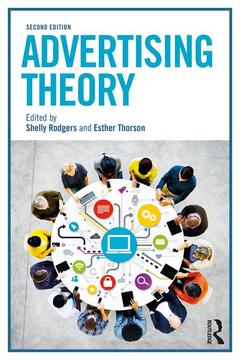Description
Advertising Theory (2nd Ed.)
Routledge Communication Series
Language: English
Subjects for Advertising Theory:
Keywords
Ad Skepticism; research; Advertising Research; message; Children’s Persuasion Knowledge; elaboration; International Advertising Research; likelihood; Uncertainty Avoidance; model; In-game Brand Placements; scholars; FCB Grid; mobile; Persuasion Knowledge; advertisings; DTC Advertising Exposure; effects; DTC Prescription Drug; integrated; Van Reijmersdal; In-game Advertising; Narrative Advertisements; Academic Advertising Research; Transportation Imagery Model; SMS Advertising; Integrated Brand Promotion; Native Advertising; Pk Activation; DTC Advertising; Consumer Socialization Theory; Narrative Ads; Non-traditional Environments; Mobile Advertising; Social Network Games
Publication date: 04-2019
· 15.2x22.9 cm · Paperback
Publication date: 04-2019
· 15.2x22.9 cm · Hardback
Description
/li>Contents
/li>Readership
/li>Biography
/li>
Advertising Theory provides detailed and current explorations of key theories in the advertising discipline. The volume gives a working knowledge of the primary theoretical approaches of advertising, offering a comprehensive synthesis of the vast literature in the area. Editors Shelly Rodgers and Esther Thorson have developed this volume as a forum in which to compare, contrast, and evaluate advertising theories in a comprehensive and structured presentation. With new chapters on forms of advertising, theories, and concepts, and an emphasis on the role of new technology, this new edition is uniquely positioned to provide detailed overviews of advertising theory.
Utilizing McGuire?s persuasion matrix as the structural model for each chapter, the text offers a wider lens through which to view the phenomenon of advertising as it operates within various environments. Within each area of advertising theory?and across advertising contexts?both traditional and non-traditional approaches are addressed, including electronic word-of-mouth advertising, user-generated advertising, and social media advertising contexts.
This new edition includes a balance of theory and practice that will help provide a working knowledge of the primary theoretical approaches and will help readers synthesize the vast literature on advertising with the in-depth understanding of practical case studies and examples within every chapter. It also looks at mobile advertising in a broader context beyond the classroom and explores new areas such as native advertising, political advertising, mobile advertising, and digital video gaming.
Part 1: Perspectives on Advertising and Advertising Theories 1. What does "Theories of Advertising" Mean? An Update 2. Coloring Outside the Lines: Suggestions for the Future of Advertising Theory 3. Agency Practitioners' Theories about Advertising: New Directions Part 2: Psychological Processes in Response to Advertisements 4. Psychological Transportation in Narrative Advertising 5. Role of Technology in Online Persuasion: A MAIN Model Perspective 6. Role of Emotion in Advertising 7. Managing Advertising in Non-Traditional Environments: A Message Processing Framework 8. The Reflexive Persuasion Game: The Persuasion Knowledge Model (1994-2017) 9: Involvement Part 3: Audiences and Roles in Advertising 10. A Theory of Advertising to Children 11. Theory Advancement in International Advertising: Drawing on Theories from Strategic Management and International Business 12. Depictions of Gender Roles in Advertising Part 5: Creativity and Advertising 13. Creativity and Ad Theory 14. A Rhetorical Theory of the Advertisement 15: Creativity and Risk Theories of Advertising Part 5: Different Types of Advertising Messages 16. A Review of Native Advertising 17. Narrative Advertisements and Narrative Processing 18. Political Advertising 19. Direct-to-Consumer Advertising of Prescription Drugs: Consumers, Physicians, Messages, and Complexity Part 6: Media and Media Devices 20. Mobile Advertising: Current and Future Research Directions 21. In-Game Advertising and Advergames: A 15-Year Review 22. Social Media and Advertising Theory 23. Digital Video Advertising Part 7: Organizations 24. Toward a Social Ecology of Advertising 25. "If It Fits…" The Definability and Consequences of Perceived Fit in Corporate Social Responsibility Initiatives 26. Brand Concepts and Advertising Part 8: Contexts of Advertising 27. How Advertising Works Within a Cultural Context: Theories and Frameworks Informing the Process 28. Interactive Advertising: Untangling the Web of Definitions, Domains, and Approaches to Interactive Advertising Scholarship from 2002-2017 29. Theories about Health and Advertising 30. Ethics and Advertising Theory 31. Theory and Law
Shelly Rodgers is Professor of Strategic Communication and William T. Kemper Fellow, Missouri School of Journalism. Supported by more than $25 million in federal and state grants, her research includes psychological processing of digital health advertising. She is a Past President of the American Academy of Advertising (2010).
Esther Thorson is Professor of Journalism and Associate Dean for Graduate Studies, Michigan State University. She publishes extensively on advertising message effects and is one of the most cited scholars in advertising. She is a Fellow of the American Academy of Advertising and International Communication Association.
These books may interest you

The Advertising Handbook 160.25 €



